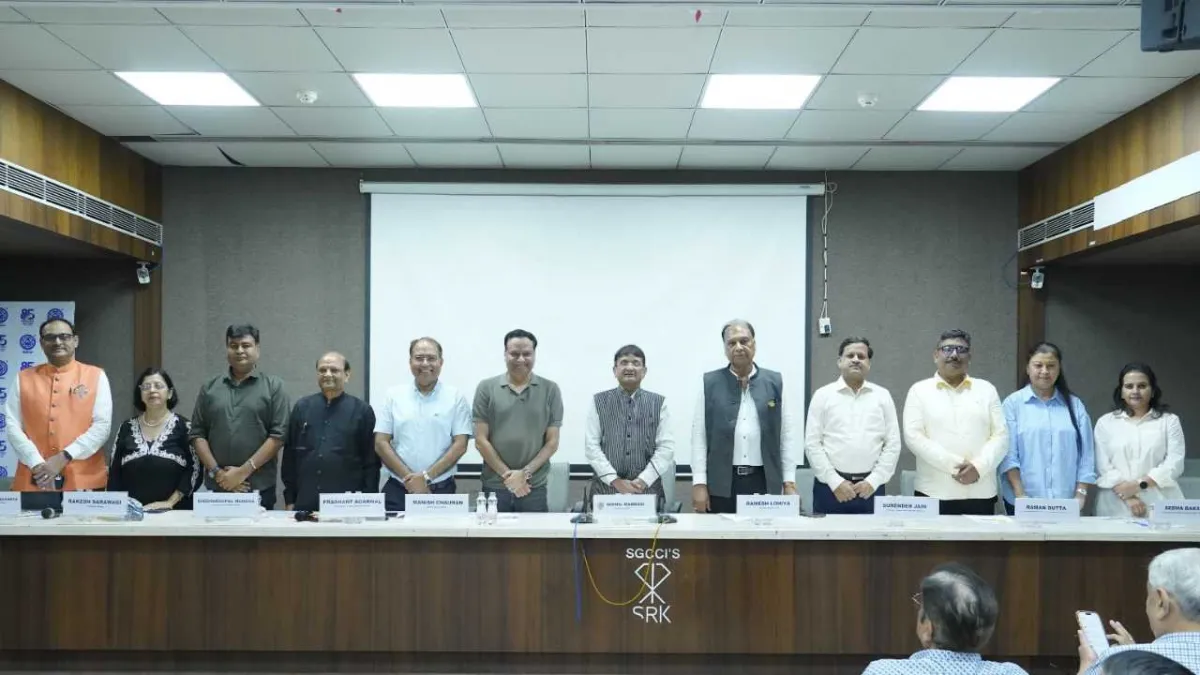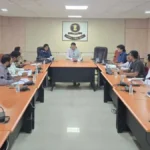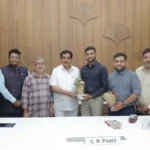Intensive Discussion on ‘The Future of Garments in Surat’ on the Fourth Day of Textile Week; Entrepreneurs Guided on Value Addition and Export Focus
Surat. Taking a significant step toward establishing Surat as a hub for ready-made garments, the Global Fabric Resource and Research Center (GFRRC) of the South Gujarat Chamber of Commerce and Industry organized a seminar on ‘The Future of Garments in Surat’ on the fourth day of Textile Week. The seminar aimed to guide Surat’s textile industrialists in advancing into garment manufacturing.
During the event, insights were shared on the immense potential of Surat’s garment industry. It was highlighted that while significant work is being done in children’s clothing, large-scale ready-made garment production could provide a new boost to Surat’s textile sector.
The Chamber of Commerce President emphasized that evolving market demands, the purchasing power of the younger generation, and the increasing use of digital platforms globally present unlimited opportunities in the garment industry. He encouraged industrialists to invest in local value addition, branding, and innovation, expressing confidence that Surat could emerge not just as a textile city but also as a hub for ready-made garments.
Discussions also covered global trends, noting that 73% of the world’s textile consumption currently comes from man-made fibers (MMF), expected to reach 80% in the next four years. While India’s textile industry is currently dominated by cotton, the future lies in polyester. Since Surat leads in polyester production, industrialists were advised to leverage this strength for garment manufacturing and exports.
Recommendations included systematic fabric preparation, mid-management importance, operational restructuring, skill development, automation, digitization, and manufacturing excellence. Suggestions were made to develop the entire supply chain—cutting, finishing, and packaging—in Surat itself, enabling direct exports of ready-made garments instead of fabrics, tripling entrepreneurs’ profits.
Entrepreneurs were also advised to pursue e-commerce training, build the ‘Brand Surat,’ and learn digital marketing. The need for common facility centers and MSME clusters in Surat was highlighted to boost garment exports.
A panel discussion was held, where industry experts shared valuable insights on technology, machinery, designing, and export-related issues for the garment industry. The seminar concluded successfully after addressing various concerns of entrepreneurs in the apparel sector.
Global Fabric Resource and Research Center (GFRRC)
The **Global Fabric Resource and Research Center (GFRRC)** is a dedicated institution focused on preserving, studying, and promoting textiles and fabrics from around the world. It serves as a hub for researchers, designers, and cultural enthusiasts, offering access to historical and contemporary textile collections. The center also highlights the cultural significance of fabrics, documenting traditional weaving techniques and their evolution across different societies.
South Gujarat Chamber of Commerce and Industry
The South Gujarat Chamber of Commerce and Industry (SGCCI), based in Surat, is one of India’s oldest and most influential trade organizations, established in 1941. It plays a key role in promoting business, industry, and economic development in the South Gujarat region. Over the decades, SGCCI has supported local enterprises, facilitated trade, and advocated for policies benefiting the region’s commercial growth.
Textile Week
“Textile Week” is an annual cultural event that celebrates the rich history and craftsmanship of textiles, often held in regions with deep textile traditions, such as Lancashire, England, or other global hubs. The event showcases heritage techniques, modern innovations, and the cultural significance of textiles through exhibitions, workshops, and demonstrations. Its origins often tie back to the industrial revolution or local artisan traditions, honoring the industry’s impact on community identity and economy.
Brand Surat
“Brand Surat” likely refers to Surat, a historic city in Gujarat, India, known for its vibrant textile and diamond industries. Established as a major Mughal-era port, Surat was a key trading hub for spices, silk, and gems, attracting European merchants in the 16th–18th centuries. Today, it blends rich cultural heritage with modern commerce, famed for its sarees, street food, and landmarks like the Surat Castle.
(If “Brand Surat” refers to a specific business or initiative, additional context would help refine the summary.)
MSME clusters
MSME (Micro, Small, and Medium Enterprise) clusters are geographic concentrations of interconnected small businesses operating in related industries, often supported by government or institutional programs to enhance productivity and competitiveness. These clusters emerged as a development strategy to foster local economies, encourage innovation, and improve access to resources like financing and training. Historically, they have played a key role in industrialization, particularly in countries like India, where initiatives such as the MSME Cluster Development Programme (CDP) aim to strengthen collective efficiency and sustainability.
Surat
Surat is a historic port city in the Indian state of Gujarat, known for its rich maritime trade history dating back to the 16th century. It was a major hub for commerce during the Mughal era, attracting European traders like the British and Dutch. Today, Surat is famous for its diamond polishing and textile industries, blending its cultural heritage with modern economic vitality.
polyester production
Polyester production began in the early 20th century, with the first synthetic polyester fiber being created in the 1930s by British chemists. It became widely popular in the 1950s due to its durability, affordability, and resistance to wrinkles, revolutionizing the textile industry. Today, polyester is one of the most commonly used fabrics worldwide, though its environmental impact has raised concerns about sustainability.
e-commerce training
E-commerce training refers to educational programs or courses designed to teach individuals or businesses how to buy, sell, and manage transactions online. These programs often cover topics like digital marketing, online store setup, payment systems, and customer engagement, reflecting the growth of online commerce since the late 20th century. As e-commerce continues to evolve, training has become essential for entrepreneurs and professionals to stay competitive in the global digital marketplace.






